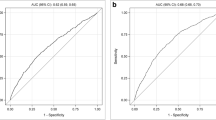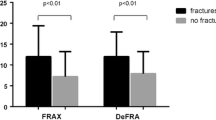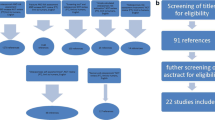Abstract
Bone mineral density (BMD) is the primary predictor of fracture, and is utilised in the definition of osteoporosis. Mass screening for osteoporosis is, however, currently not recommended. The primary objective of this study was to develop, validate and assess a simple, non-invasive scoring system to identify women at high risk of fracture. Using baseline data of the Dubbo Osteoporosis Epidemiology Study, a sample of 1256 women aged 60 or above was randomly divided into a development cohort (n=846) and a validation cohort (n=410). Low BMD was evaluated by DXA, with respect to 2.0 or 2.5 SD below the mean for young normal women at the femoral neck and lumbar spine. A logistic regression model was used to derive a predictive score, “DOEScore”, in the development cohort, and the performance of this score was then assessed in the validation cohort. Incident fractures over 9395 person-years (median of follow-up duration: 8.4 years) were identified by X-ray records. Approximately 57% and 40% of women (in both cohorts) had T-scores less than −2.0 and greater than −2.5, respectively. Only age, body weight, and previous fracture were significantly related to BMD at both the femoral neck and lumbar spine. These three variables were used in the development of the DOEScore. When applied to the validation cohort, the sensitivity and specificity of DOEScore were 0.82 and 0.52, respectively, for selecting women with T-scores less than −2.5; the area under the receiver operating characteristic (ROC) curve was 0.75. These goodness-of-fit indices were comparable to, or better than, those obtained by the FOSTA, SOFSURF and ORAI score systems. However, neither the DOEScore nor other score systems reliably identify women with incident fractures; for DOEScore, the sensitivity and specificity were 0.52 and 0.49, respectively, with an area under the ROC curve of 0.48. Clinical risk scores can be used to identify women likely to have low BMD (albeit with low specificity), but they are not a useful tool to identify women who will have a fracture.


Similar content being viewed by others
References
Cummings SR, Melton LJ (2002) Epidemiology and outcomes of osteoporotic fractures. Lancet 359:1761–1767
Nguyen TV, Eisman JA, Kelly PJ, Sambrook PN (1996) Risk factors for osteoporotic fractures in men. Am J Epidemiol 144:255–263
Nguyen T, Sambrook P, Kelly P, Jones G, Lord S, Freund J, Eisman J (1993) Prediction of osteoporotic fractures by postural instability and bone density. BMJ 307:1111–1115
Kanis JA (1997) Diagnosis of osteoporosis. Osteoporos Int 7:S108–S116
Black DM, Cummings SR, Karpf DB, Cauley JA, Thompson DE, Nevitt MC, Bauer DC, Genant HK, Haskell WL, Marcus R, Ott SM, Torner JC, Quandt SA, Reiss TF, Ensrud KE (1996) Randomised trial of effect of alendronate on risk of fracture in women with existing vertebral fractures. Fracture Intervention Trial Research Group. Lancet 348:1535–1541
Ettinger B, Black DM, Mitlak BH, Knickerbocker RK, Nickelsen T, Genant HK, Christiansen C, Delmas PD, Zanchetta JR, Stakkestad J, Gluer CC, Krueger K, Cohen FJ, Eckert S, Ensrud KE, Avioli LV, Lips P, Cummings SR (1999) Reduction of vertebral fracture risk in postmenopausal women with osteoporosis treated with raloxifene: results from a 3-year randomized clinical trial. Multiple Outcomes of Raloxifene Evaluation (MORE) Investigators. JAMA 282:637–645
Cummings SR, Black DM, Thompson DE, Applegate WB, Barrett-Connor E, Musliner TA, Palermo L, Prineas R, Rubin SM, Scott JC, Vogt T, Wallace R, Yates AJ, LaCroix AZ (1998) Effect of alendronate on risk of fracture in women with low bone density but without vertebral fractures: results from the Fracture Intervention Trial. JAMA 280:2077–2082
Burger H, van Daele PLA, Algra D, van den Ouweland FA, Grobbee DE, Hofman A, van Kujik C, Schutte HE, Birkenhager JC, Pols HAP (1994) The association between age and bone mineral density in men and women aged 55 years and over: the Rotterdam Study. Bone Miner Res 25:1–13
Edelstein SL, Barett-Connor E (1993) Relation between body size and bone mineral density in elderly men and women. Am J Epidemiol 138:160–169
Hannan MT, Felson DT, Anderson JJ (1992) Bone mineral density in elderly men and women: results from the Framingham Osteoporosis Study. J Bone Miner Res 7:547–553
Nguyen TV, Kelly PJ, Sambrook PN, Gilbert C, Pocock NA, Eisman JA (1994) Life-style factors and bone density in the elderly: Implications for osteoporosis prevention. J Bone Miner Res 9:1339–1346
Cadarette SM, Jaglal SB, Murray TM (1999) Validation of the Simple Calculated Osteoporosis Risk Estimation (SCORE) for patient selection for bone densitometry. Osteoporos Int 10:85–90
Black DM, Steinbuch M, Palermo L, Dargent-Molina P, Lindsay R, Hoseyni MS, Johnell O (2001) An assessment tool for predicting fracture risk in postmenopausal women. Osteoporos Int 12:519–528
Lydick E, Cook K, Turpin J, Melton M, Stine R, Byrnes C (1998) Development and validation of a simple questionnaire to facilitate identification of women likely to have low bone density. Am J Manag Care 4:37–48
Cadarette SM, Jaglal SB, Kreiger N, McIsaac WJ, Darlington GA, Tu JV (2000) Development and validation of the Osteoporosis Risk Assessment Instrument to facilitate selection of women for bone densitometry. CMAJ 162:1289–1294
Weinstein L, Ullery B (2000) Identification of at-risk women for osteoporosis screening. Am J Obstet Gynecol 183:547–549
Koh LK, Sedrine WB, Torralba TP, Kung A, Fujiwara S, Chan SP, Huang QR, Rajatanavin R, Tsai KS, Park HM, Reginster JY; Osteoporosis Self-Assessment Tool for Asians (OSTA) Research Group (2001) A simple tool to identify Asian women at increased risk of osteoporosis. Osteoporos Int 12:699–705
Black DM, Steinbuch M, Palermo L, Dargent-Molina P, Lindsay R, Hoseyni MS, Johnell O (2001) An assessment tool for predicting fracture risk in postmenopausal women. Osteoporos Int 12:519–528
Angus RM, Sambrook PN, Pocock NA, Eisman JA (1989) A simple method for assessing calcium intake in Caucasian women. J. Am Dietet Assoc 89:209–214
Nguyen TV, Sambrook PN, Eisman JA (1997) Source of variability in bone density: implication for study design and analysis. J Bone Miner Res 12:124–135
Seeman E (2000) Selection of individuals for prevention of fractures due to bone fragility. Bailliere’s Best Pract Res Clin Endocrinol Metab 14:233–249
Mema HE, Meema S (1987) Postmenopausal osteoporosis: simple screening method for diagnosis before structural failure. Radiology 164:405–410
Marshall D, Johnell O, Wedel H (1996) Meta-analysis of how well measures of bone mineral density predict occurrence of osteoporotic fractures. BMJ 312:1254–1259
Center JR, Nguyen TV, Schneider D, Sambrook PN, Eisman JA (1999) Mortality after all major types of osteoporotic fracture in men and women: an observational study. Lancet 353:878–882
National Osteoporosis Foundation (1999) Physician’s guide to prevention and treatment of osteoporosis. Excerpta Medica, Belle Mead, N.J.
Silverman SL, Greenwald M, Klein RA, Drinkwater BL (1997) Effect of bone density information on decisions about hormone replacement therapy: a randomized trial. Obstet Gynecol 89:321–325
Phillipov G, Mos E, Scinto S, Phillips PJ (1997) Initiation of hormone replacement therapy after diagnosis of osteoporosis by bone densitometry. Osteoporos Int 7:162–164
O’Neill S, Eisman JA, Glasziou P et al. (1997) The prevention and treatment of osteoporosis (consensus statement). Med J Aust 167:S4–S15
Author information
Authors and Affiliations
Corresponding author
Rights and permissions
About this article
Cite this article
Nguyen, T.V., Center, J.R., Pocock, N.A. et al. Limited utility of clinical indices for the prediction of symptomatic fracture risk in postmenopausal women. Osteoporos Int 15, 49–55 (2004). https://doi.org/10.1007/s00198-003-1511-3
Received:
Accepted:
Published:
Issue Date:
DOI: https://doi.org/10.1007/s00198-003-1511-3




